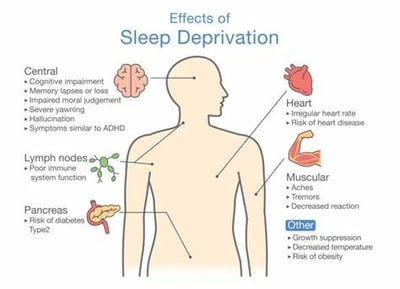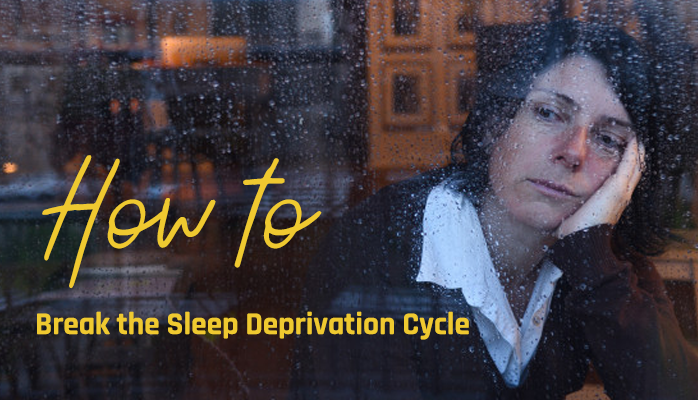The sleep deprivation cycle is one that many struggle with chronically, essentially consisting of being sleep deprived for days followed by sleep binging, which leads to even more late nights and continued sleep deprivation. It’s a self-perpetuating cycle that commonly occurs during the week with sleep deprivation and "catch up" during the weekend.
The opposite of the sleep deprivation cycle is consistent, sufficient sleep, as opposed to being deprived of sleep. Sleep deprivation is insidious, and can be result in a lower quality of life, lower expectancy, and decreased performance in every aspect of life. Breaking the cycle is important for overall life quality and health. Continue reading this blog post where we discuss a number of tips to help break this cycle.
Comfortable Sleeping Surface
Is your bed comfortable? How old is it? Is it causing you pain? Your “sleep assets,” or aspects of your environment that are sleep inducing are important components and should be highly-valued.
Sleep assets include a good mattress/topper, comfortable pillows, quality sheets, and a comforting comforter. These assets can be obtained on a budget as well. Even if you don’t have a lot of money to spend on a mattress, a couple hundred dollars can go a long way in getting a nice memory foam topper and excellent pillow.
Comfortable Sleeping Environment
 The sleeping environment is extremely important, in fact critical, to sleeping well. There are three essential components to an optimal sleeping environment:
The sleeping environment is extremely important, in fact critical, to sleeping well. There are three essential components to an optimal sleeping environment:
- A quiet room
- A dark room
- A clean room
Depending on your existing environment, meeting these three conditions may be a little or a lot of work. Some tips to make it easier are:
- Using earplugs if you live in a loud area
- Use blackout curtains if you live near city lights or in the far north (like here in Alaska)
- Using essential oils
- Doing laundry more often (clean sheets!)
- Spending money on other items to create a more restful sleeping quarter
Reduce Coffee and Alcohol
Coffee and alcohol are the enemies of quality sleep. Of course, for most of us that means making lifestyle changes! These lifestyle changes usually include:
- Not drinking alcohol right before bed, as alcohol reduces REM sleep and inhibits quality
- Drinking less coffee
- Sticking to drinking coffee in the morning
- Limiting liquids directly before bed
If coffee or alcohol are common nighttime habits, then cutting back may be more challenging. However, after a moment of adjustment, you hopefully will begin to see the benefit.
Condition Your Mind with a Bedtime Routine
A pre-bedtime activity that you do religiously before bed can be transformative for your sleep. This is due to the idea of conditioning introduced by the famous Pavlov's Dog Study. Pavlov’s dogs salivated every time they heard the bell ring because Pavlov always fed the dog after ringing the bell. This is known as conditioning. Doing the same activities before bed every night can have the same effect – condition your body to start producing melatonin and slow down metabolic process to prepare for sleep. Some proven activities are:
- Taking a hot bath
- Reading
- Listening to a book, podcast, etc.
- Meditating
- Journal writing
There are many other possibilities depending on your taste and interests.
Avoid Screens Before Bed
The blue light from screens delay the release and decreases the amount of melatonin, the hormone that regulates sleep. Melatonin is the hormone that regulates sleep. This rule is especially hard to follow because we are in the digital age with, often, more devices than people in the home:
Furthermore, apps and games are designed to keep the user engaged, therefore, without a clear stopping point, the risk of continuous scrolling is high. Therefore, the best practice is to avoid screens in the hour before bed to decrease the risk of getting stuck.
Keep a Consistent Bedtime
Bedtimes are useful sleep practices, regardless of age. It is a way of self-regulating by setting boundaries and rules. However, when creating a bedtime, make sure to keep it realistic. Think of one that makes sense and balances lifestyle demands with minimum hours required for sleep.
What If You’ve Tried Everything Without Success?
Of course, there are some sleep conditions that will make it seemingly impossible to overcome the sleep deprivation cycle, in which case you may need external help. These conditions include:
- Sleep apnea
- Insomnia
- Restless leg syndrome
- Circadian rhythm disorders
If you live in Alaska and have tried everything to break the sleep deprivation cycle, please click the orange button below to take a free online sleep test and talk with one of our sleep health professionals.


